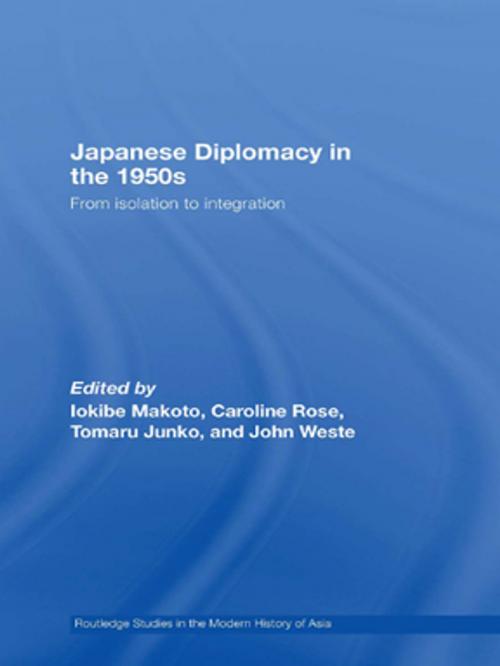Japanese Diplomacy in the 1950s
From Isolation to Integration
Nonfiction, Social & Cultural Studies, Social Science, Cultural Studies, Ethnic Studies, Political Science, International, International Relations| Author: | ISBN: | 9781134191901 | |
| Publisher: | Taylor and Francis | Publication: | February 19, 2008 |
| Imprint: | Routledge | Language: | English |
| Author: | |
| ISBN: | 9781134191901 |
| Publisher: | Taylor and Francis |
| Publication: | February 19, 2008 |
| Imprint: | Routledge |
| Language: | English |
This book provides a detailed examination of Japan's diplomatic relations in the 1950s, an important decade in international affairs when new structures and systems emerged, and when Japan established patterns in its international relationships which continue today. It examines the process of Japan's attempts to rehabilitate itself and reintegrate into a changing world, and the degree of success to which Japan achieved its goals in the political, economic and security spheres. The book is divided into three parts, each containing three chapters: Part I looks at Japan in the eyes of the Anglo-American powers; Part II at Japanese efforts to gain membership of newly forming regional and international organizations; and Part III considers the role of domestic factors in Japanese foreign policy making. Important issues are considered including Japanese rearmament and the struggle to gain entry into the United Nations. In contrast to much of the academic literature on post-war Japanese diplomacy, generally presenting Japan as a passive actor of little relevance or importance, this book shows that Japan did not simply sit passively by, but formed and attempted to instigate its own visions into the evolving regional and global structures. It also shows that whilst Japan did not always figure as highly as its politicians and policy makers may have liked in the foreign policy considerations of other nation states, many countries and organizations did attach a great deal of importance to re-building relations with Japan throughout this period of re-adjustment and transformation.
This book provides a detailed examination of Japan's diplomatic relations in the 1950s, an important decade in international affairs when new structures and systems emerged, and when Japan established patterns in its international relationships which continue today. It examines the process of Japan's attempts to rehabilitate itself and reintegrate into a changing world, and the degree of success to which Japan achieved its goals in the political, economic and security spheres. The book is divided into three parts, each containing three chapters: Part I looks at Japan in the eyes of the Anglo-American powers; Part II at Japanese efforts to gain membership of newly forming regional and international organizations; and Part III considers the role of domestic factors in Japanese foreign policy making. Important issues are considered including Japanese rearmament and the struggle to gain entry into the United Nations. In contrast to much of the academic literature on post-war Japanese diplomacy, generally presenting Japan as a passive actor of little relevance or importance, this book shows that Japan did not simply sit passively by, but formed and attempted to instigate its own visions into the evolving regional and global structures. It also shows that whilst Japan did not always figure as highly as its politicians and policy makers may have liked in the foreign policy considerations of other nation states, many countries and organizations did attach a great deal of importance to re-building relations with Japan throughout this period of re-adjustment and transformation.















